-

新人教版高中英语必修3Unit 1 Festivals and Celebrations-Reading and Thinking教学设计
The topic of this part is “Discover the reasons for festivals and celebrations.The Listening & Speaking & Talking part aims at talking about the experiences and feelings or emotions about the festivals and celebrations. This section aims at detecting the reason why the people celebrate the festivals, the time, the places, the types and the way of celebrations. It also explains why some traditions in the old celebrations are disappearing, like the firecrackers in the big cities and some new things are appearing like the prosperity of business or commerce. 1. Students can talk about what festivals they know and the reasons and the way of celebrating them.2. Students should learn the reading skills such as the headline and get the topic sentences, the structures of articles.3. Students can understand the past, the present situation of some festival around the world and why there are some changes about them. 4. Students can have the international awareness about the festivals.1. Students should learn the reading skills such as the headline and get the topic sentences, the structures of articles.2. Students can understand the past, the present situation of some festival around the world and why there are some changes about them.Step 1 Lead in---Small talkWhat festival do you like best ? Why ?I like the Spring Festivals because I can set off the fireworks, receive the lucky money and enjoy the Gala with my families.Step 2 Before reading---Pair workWhy do people celebrate different festivals ?The Spring Festivals is to celebrate the end of winter and the coming of spring and new life.The Mid-autumn Day is to celebrate the harvest and admire the moon.

新人教版高中英语必修3Unit 1 Festivals and Celebrations-Listening &Speaking&Talking教学设计
The theme of this section is “Talk about festival activities and festival experiences”.Festival and holiday is a relaxing and interesting topic for students. This part talks about the topic from the daily life of students’. In the part A ---Listening and Speaking, there are three conversations among different speakers from three countries(Japan, Rio and China), where the speakers are participating in or going to participate in the festivals and celebrations. So listening for the relationship among them is a fundamental task. Actually, with the globalization and more international communication, it is normal for Chinese or foreigners to witness different festivals and celebrations in or out of China. In the Conversation 1, a foreign reporter is interviewing a Japanese young girl who just had participated in the ceremony of the Coming-of-Age Day on the street and asking her feeling about the ceremony and the afterwards activities. Conversation 2, Chinese girl Li Mei is witnessing the Rio Carnival for the first time, and her friend Carla gives her some advice on the costumes which enables her to match with the carnival to have a good time. Conversation 3, a Chinese guide is showing a group of foreign visitors around the Lantern Festival and introducing the customs of the festival to them. The three conversations have a strong vitality and insert the festival and cultural elements from different countries. So perceiving the festivals and cultures from different countries is the second task. At the same time, the scripts also insert the targeted grammar --- v-ing as attributive and predicative, which students can perceive and experience in a real context and make a road for the further study. That is the third task. In the Part B--- Listening and Talking, the theme is “Talk about festival experience”, which is the common topic in our daily conversations. During the conversation, Song Lin, a Chinese student, asked Canadian friend Max about how to spend Christmas. In the conversation, Song Lin talked about experience and the feelings during the Chinese Spring Festival, during which there are not only some enjoyable things but some unpleasant things. After the listening, perhaps students find there are some similarities between Christmas and the Chinese Spring Festival as there are some differences in the origins and celebrations. For example, people always visit friends and relatives, decorate their houses, have a big dinner together, chat and give presents to each other.

新人教版高中英语必修3Unit 1 Festivals and Celebrations-Reading for writing教学设计二
Step 3 Analyzing article structureActivity 31. Teachers raise questions to guide students to analyze the chapter structure of this diary and think about how to describe the festival experience. (1)What should be included in the opening/body/closing paragraph(s)?(2)How did the writer arrange his/her ideas?(3)What kind of interesting details did the writer describe?(4)How did the writer describe his/her feelings/emotions during the event?2. Students read and compare the three sentence patterns in activity 2. Try to rewrite the first paragraph of the diary with these three sentence patterns. After that, students exchange corrections with their partners. Such as:●This was my first time spending three days experiencing the Naadam Festival in China’s Inner Mongolia Autonomous Region and it was an enjoyable and exciting experience. ●I'll never forget my experience at the Naadam Festival because it was my first time to watch the exciting Mongolian games of horse racing, wrestling, and archery so closely. ●I'll always remember my first experience at the Naadam Festival in China’s Inner Mongolia Autonomous Region because it was so amazing to spend three days witnessing a grand Mongolian ceremony. Step 4 Accumulation of statementsActivity 41. Ask the students to read the diary again. Look for sentences that express feelings and emotions, especially those with the -ing form and the past participle. Such as:● …horse racing, wrestling, and archery, which are all so exciting to watch. ● some amazing performances● I was surprised to see…● I was a little worried about. . . ● feeling really tiredOther emotional statements:●I absolutely enjoyed the archery, too, but the horse races were my favourite part. ●I'm finally back home now, feeling really tired, but celebrating Naadam with my friend was totally worth it. ●He invited me back for the winter to stay in a traditional Mongolian tent and cat hot pot. I can’t wait!2. In addition to the use of the -ing form and the past participle, the teacher should guide the students in the appreciation of these statements, ask them to memorize them, and encourage them to use them reasonably in writing practice.

新人教版高中英语必修3Unit 1 Festivals and Celebrations-Reading for Writing教学设计一
The topic of this part is “Write about your festival experience”.During the Listening and Speaking and Talking, students are just asked to say out their festival experiences such as the Spring Festival, Mid-autumn Day, but this part students will be asked to write down their own festival experiences. During the reading part, it introduces the Naadam Festival in Inner Mongolia Autonomous Region, which can give students a good example to imitate. Students not only learn the festival, but touch and feel the Inner Mongolian’s character, the spirit and cultural atmosphere, which can help students form the cultural awareness and learn to enjoy and value the diversity of Chinese culture.Concretely, the dairy tells the experience that the author spent the Naadam Festival in Inner Mongolia Autonomous Region with his/her friend. The structure is clear. In the opening paragraph, it introduces the topic of the Naadam Festival and the whole feeling. Then it introduces the items of the festival like the ceremony, wrestling and horse racing. Finally, it summarizes this experience. Because this part is a travel journal, we must guide students pay more attention to these details: 1. use the first person. 2. use the past tense to tell the past thing and use the present or future tense to describe the scenery. 3. use the timeline to tell the development. 4. be careful for the author’s psychology, emotion and feeling, etc.1. Read quickly to get main idea; read carefully to get the detailed information about Naadam Festival.2. Learn the structure of the reading article and language.3. Write an article about a festival experience4. Learn to use the psychology, emotions and feeling in the writing.1. Write an article about a festival experience.2. Use the structure of the reading article and language.
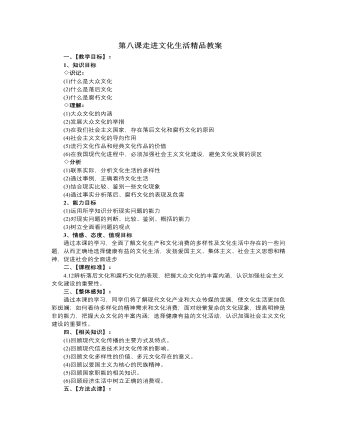
人教版高中政治必修3第八课走进文化生活精品教案
1.加强社会主义文化建设的必要性在人类历史的长河中,各种思想文化总是相互冲击、交汇、融合.奔腾向前,永不停息。今天,我们面对的文化有传统的和现代的、外来的和本土的、进步的和落后的、先进的和腐朽的、积极的和颓废的,等等。各种各样的文化有吸纳又有排斥,有融合又有斗争,有渗透又有抵御,呈现出前所未有的相互交织、相互激荡之势。在这种文化发展的大背景下,在我国现代化建设过程中,有必要弘扬我国社会主义的主流文化,这样有利于保证我国社会主义文化发展的方向。2.大力加强社会主义文化建设(1)中国特色社会主义文化在我国文化生活中处于主导地位。中国特色社会主义文化,始终坚持以科学的理论武装人,以正确的舆论引导人,以高尚的精神塑造人,以优秀的作品鼓舞人,无论是思想内容还是表现形式,都发挥着强有力的导向和示范作用。社会主义文化以其自身的科学性和先进性,并依靠社会主义政治和经济力量,在人民大众的文化生活中始终占据着主导地位。
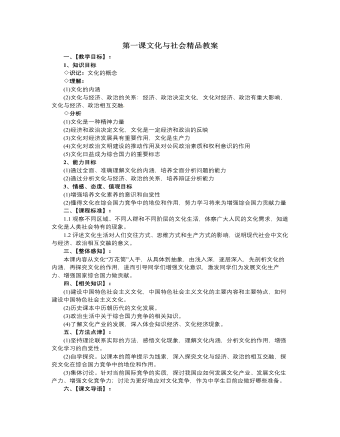
人教版高中政治必修3第一课文化与社会精品教案
(2)历史课本中历朝历代的文化发展。(3)政治生活中关于综合国力竞争的相关知识。(4)了解文化产业的发展,深入体会知识经济、文化经济现象。五、【方法点津】:(1)坚持理论联系实际的方法,感悟文化现象,理解文化内涵,分析文化的作用,增强文化学习的自觉性。(2)自学探究。以课本的简单提示为线索,深入探究文化与经济、政治的相互交融,探究文化在综合国力竞争中的地位和作用。(3)集体讨论。针对当前国际竞争的实质,探讨我国应如何发展文化产业、发展文化生产力、增强文化竞争力;讨沦为更好地应对文化竞争,作为中学生目前应做好哪些准备。六、【课文导语】:文化,一个我们十分熟悉的词汇。然而“熟知并非真知”。有人说,文化是知识;有人说,文化是艺术。究竟什么是“文化”?只要在社会生活中细细体味,我们就能真切地感悟“文化”的内涵与文化的力量。
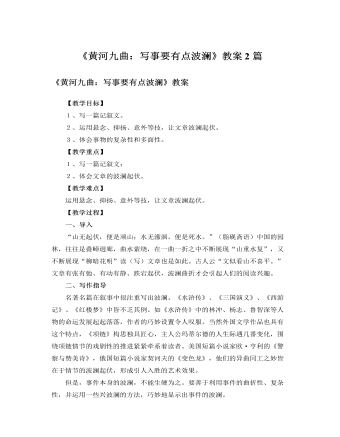
人教版高中语文必修1《黄河九曲:写事要有点波澜》教案2篇
1.悬念法悬念法又称关子。它是作者为了激发那种“紧张与期待的心理活动”,在行文中有意采取的一种积极而有效的手段。这种手段包括“设悬”和“解悬”两方面。所谓 “设悬”就是设置悬念,即在情节发生发展的关键时刻或人物命运攸关的重要关头,叙述戛然而止,转叙他事。从而引起读者强烈的寻根问底的兴趣。所谓“解悬” 也叫“释悬”,就是指在情节发展的特定阶段,通过矛盾的解决,揭示事情原委和人物命运的结局,使读者的期待心理得以满足。如《驿路梨花》,当人们正为露宿而发愁时出现了一间神秘的小屋,小屋的主人是谁呢?猜想间,有人来了,但也不是屋子主人,那小屋子的主人是谁呢?终于知道了小屋是解放军盖的,但为什么要盖这间小屋呢?这样“设悬——释悬——带出新悬念”,环环相扣、层层递进,使文章韵味无穷。
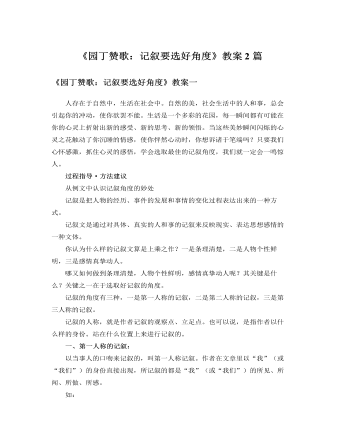
人教版高中语文必修1《园丁赞歌:记叙要选好角度》教案2篇
天上有明月,年年照相思。她夜夜沉醉在梦中。梦把空间缩短了,梦把时间凝固了,梦把世界净化了。梦中没有污秽,没有嘈杂,没有邪恶;梦中没有分离,没有创伤,没有痛苦;梦中只有柔和的月色,只有温馨的爱;梦使她永远年轻,使她不原醒来。…………啊,那个世界,是为天下最真最善最美的心灵准备的,艺术家怀着虔诚的情感,用充满魔力的琴弦,在人们的心中筑起了一座不朽的天堂,它像天地一样长久,日月一样永恒!新月微微地闭着眼睛,她清清楚楚地看到了那座天堂,真真切切地触到了那座天堂,冰凌砌成墙壁,白云铺成房顶,雾霭织成纱幔,星星串成明灯;在那里,她的头发像沐浴之后那样清爽柔软,随风飘拂,她的肌肤像披着月光那样清凉润滑,她的那颗心啊,像浸润着蒙蒙细雨的花蕾,挂着晶莹的露珠,自由地呼吸……她沉醉在那个一尘不染的美好的境界,如歌如诗,如梦如幻,如云如月,如水如烟……

新人教版高中英语必修1Unit 2 Travelling Around-Listening and Speaking & Listening and Talking教案
【教学目标与核心素养】1. Instruct students to get main facts by listening and motivate them to talk about the topics about how to prepare for the trip and make reservations by listening and ultimately can make travel arrangements and reservations. 2. Develop students’ sense of cooperative learning and individual thinking capability. 3. Develop students’ different listening skills to solve different listening comprehensive problems.4. Help students to understand how to use the structures “the present continuous tense (be doing) is used to express future plans.【教学重难点】1. Teach students how to focus on key words, not on single words or grammar.2. Prompt Ss to talk about the related topics, such as how to prepare for the trip and make a travel plan.【教学过程】Step 1: Listening and SpeakingLead inThe teacher is advised to talk with their students about the places that they want to travel most both at home and abroad: boys and girls, if you have a chance to travel around the world, where will you go? After their small talk, the teacher can move on by finishing the following listening task:Before travelling, what do we need to prepare for the trip?

新人教版高中英语必修3Unit 2 Morals and Virtues-Reading for Writing教学设计
1. 这个寓言是一个关于一位国王古寓言。 The fable is an old fable about a king.2.作者用这个故事让读者对于社区的问题负有个人责任的必要印象深刻。The author used the story to impress upon readers with the need to take personal responsibility for problems in the community.3. 这个故事十分成功的实现了它的目的。The story was quite successful in achieving its purpose.Step 7 WritingPlease write a review of the story according the outline above.The fable is an old fable about a king who thought his people are lazy, so he put a large stone in the middle of the road and hides and waited to see if anyone will try to move it.The author used this story to impress upon readers with the need to take personal responsibility for problems in the community. The story was quite successful in achieving its purpose, and I liked it because it had a clear moral.However, while the moral of the story is clear, the actions of the king seemed pointless to me, because none of the characters in the story learnt anything. For this reason, I think there are better stories that can be used to impress upon people with the need for personal responsibility.Step 8 Pair workExchange drafts with a partner. Use this checklist to help your partner revise his/her draft.1. Does the writer give a short description of the story ?2. Does the description include the most important details of the story ?3. Does the writer give his or her opinion about the character or their actions ?4. Is the review well-organised ? 5. Does the writer use the -ing form as the adverbial correctly in the writing ?6. Are there any grammar, spelling, or punctuation errors ?Step 9 HomeworkPut up your revised draft in the classroom or read it to your class.

新人教版高中英语必修3Unit 2 Morals and Virtues-Discovering Useful Structure教学设计
1. 表示时间。Hearing these stories, I’m skeptical about the place. = When I heard these stories. . . 2. 表示原因。Not knowing his address, I can’t send this book to him. = Because/Since/As I don’t know his address. . . 3. 表示结果。His father died, leaving him a lot of money. =. . . and left him a lot of money4. 表示条件。Going straight down the road, you will find the department store. = If you go straight down the road. . . 5. 表示让步。Being tired, they went on working. =Although they were tired. . . 6. 表示行为方式、伴随情况或补充说明。He lay on the grass, staring at the sky for a long time. =. . . and stared at the sky for a long time注意:非谓语动词作状语时, 如所提供的动词不能和句子中的主语保持一致, 动词-ing形式必须有自己的逻辑主语, 通常由名词或代词来担任, 这就是独立主格结构。The last bus having gone, we had to walk home. (having gone的逻辑主语是the last bus, 而不是we)Weather permitting, the football match will be played on Friday. (permitting的逻辑主语是time, 而不是the football match)Step 7 Practice1. ________(study) hard, you are sure to get first prize. 2. People use plastic in their daily life, _______(leave) large amounts of waste. 3. ________(work) hard at your lessons, you are to succeed. 4. The old man, ____________(work) abroad for twenty years, is on the way back to his motherland. 5. ______________(finish) his homework, he was playing on the playground. Answers: 1. Studying 2. leaving 3. Working 4.having worked 5. Having finishedStep 8 HomeworkFinish the homework on Page 22.

新人教版高中英语必修3Unit 2 Morals and Virtues-Listening &Speaking&Talking教学设计
Example:One day, a poor boy who was trying to pay his way through school by sending newspapers door to door found that he only had one dime(一角)left. He was so hungry that he decided to beg for a meal at the next house.However, he lost his nerve when a lovely young woman opened the door. Instead of a meal he asked for a drink of water. She thought he looked hungry so she brought him a large glass of milk. He drank it slowly, and then asked, “How much do I owe you?” “You don’t owe me anything,” she replied, “Mother has taught me never to accept pay for a kindness.” “Then I thank you from the bottom of my heart.” With these words, Howard Kelly left that house.Years later the woman became badly ill and was finally sent to the hospital in a big city. Dr. Howard Kelly, now famous, was called in. When he heard the name of the town she came from, a strange light filled his eyes. Dressed in his doctor’s clothes, Dr. Kelly went into her room and recognized her at once. From that day on, he gave special attention to her, and decided to do his best to save her life.At last the woman was saved. Dr. Kelly asked the business office to pass the final bill to him. He looked at it and then wrote something on the side. The bill was sent to the woman’s room. She was afraid to open it because she was sure that it would take the rest of her life to pay for it off. Finally she looked, and the note on the side of the bill caught her attention. She read these words: “Paid in full with a glass of milk, Dr. Howard Kelly.” Tear of joy flooded her eyes.

新人教版高中英语必修3Unit 2 Morals and Virtues-Reading and Thinking教学设计
The topic of this part is “Learn to make choices in life”.The Listening & Speaking & Talking part aims at the moral dilemmas, and this part is about making choices in life. The heroin is Lin Qiaozhi, a famous medical scientist, made a great contribution to our country’s medical care. Most importantly, her life experience can inspire our students whether in studying or the development of career. she had moral dilemmas and life choices, which are similar to the students who will step into society. Besides, Lin has quite good virtues like kindness, self-improvement, insistence, job-loving , generosity and responsibility, which is worth being learned.Concretely, this article is a biography about Lin Qiaozhi. The article tells her whole life according the timeline, among which the life choices is emphasized. For example, whether married or chased her dream, returned home or stayed abroad, family or public, her choices all reflected her faith, spirit, responsibility and devotion.1. Fast reading to get the detailed information about Lin Qiaozhi; careful reading to do the deductive information.2. Learn the reading skills--deductive judgement according the context.3. Study the structure features and language features. 4. Communicate about Lin’s life choices and reflect their own life choices.1. Learn the reading skills--deductive judgement according the context.2. Study the structure features and language features.3. Communicate about Lin’s life choices and reflect their own life choices.Step 1 Lead in---Small talkWhat are some important life choices?Importance choices: university study, jobs and marriage partners. Because they can determine our future.

人教版新课标高中地理必修2第一章第三节人口合理容量教案
生:环境承载力是指环境能持续供养的人口数量。师:对了。但是有同学仍然会感到这是一个很抽象的概念。下面我们具体来了解什么是环境承载力。我们可以从两个部分去理解:一、环境,它主要是指环境的单个要素(如:土地、水、气候、植被等。)及其组合方式。二、是承载力,它指在特定的条件下,具体某事物能承受的某种活动的最大值。那环境承载力的科学定义是怎样表达的呢?生:环境承载力是指某一时期,某种状态条件下,某地区环境所能承受的人类活动作用的阈值。师:很对。 我们可以用一个生动的例子来说明。一只木桶里面的水的多少在底面积固定不变的情况下是由哪块木板来决定?生:最短的那块。师:确实如此。这就是我们平常所讲的 “木桶效应”。那影响环境承载力的大小也是由环境个要素里面最紧缺的那个要素来决定的。下面我们用一个例子来印证一下。
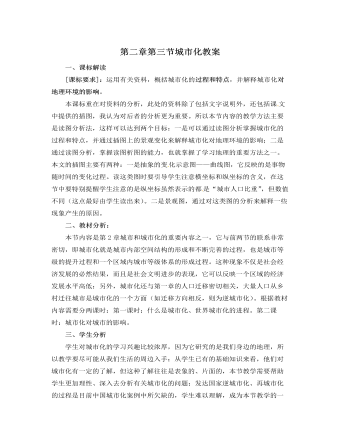
人教版新课标高中地理必修2第二章第三节城市化教案
[补充]:郑州是特大城市,我们对灯火通明的夜晚都有深刻的体会,我们都体会过光给他们带来的好处,而对过多过亮的光带来的危害则很少认真地思考过,且光污染给都市人们和其他生物和环境带来的不利影响也越来越大,所以,我在这儿给同学们补充光污染,目的是提醒他们要增强环保意识,要理解城市在建设过程中要减少城市各类活动对环境的污染;另外,随着城市的不断发展,还可能会产生新 的污染物。还培养了学生用发展的眼光来看世界。[思考]:如何降低城市化对地理环境产生的影响?[答]:发展生态城市,使人工环境和自然环境和谐统一起来。一方面在城市建设中,要发展低污染的节能建筑和绿色交通,减少城市各类活动对环境的污染;另一方面使城市景观尽可能地与山、河、湖、海、植被等自然景观保持协调,建立一种良性循环。
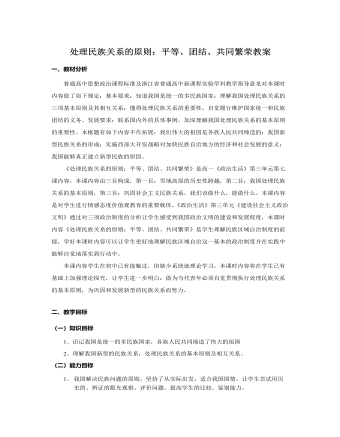
人教版高中政治必修2处理民族关系的原则:平等、团结、共同繁荣教案
一、教材分析普通高中思想政治课程标准及浙江省普通高中新课程实验学科教学指导意见对本课时内容做了如下规定:基本要求:知道我国是统一的多民族国家;理解我国处理民族关系的三项基本原则及其相互关系;懂得处理民族关系的重要性,自觉履行维护国家统一和民族团结的义务。发展要求:联系国内外的具体事例,加深理解我国处理民族关系的基本原则的重要性。本框题有如下内容不作拓展:我们伟大的祖国是各族人民共同缔造的;我国新型民族关系的形成;实施西部大开发战略对加快民族自治地方的经济和社会发展的意义;我国能够真正建立新型民族的原因。《处理民族关系的原则:平等、团结、共同繁荣》是高一《政治生活》第三单元第七课内容,本课内容由三目构成,第一目:雪域高原的历史性跨越,第二目:我国处理民族关系的基本原则,第三目:巩固社会主义民族关系,我们该做什么,能做什么。
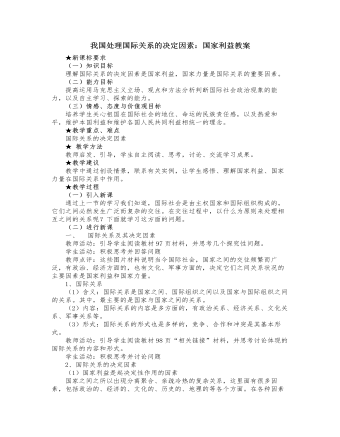
人教版高中政治必修2我国处理国际关系的决定因素:国家利益教案
从国际法角度看,国际社会的每一个主权国家应该是一律平等的,但是,在现实的国际关系中,每个国家的国际地位、国际影响力,历来都是由国家力量决定的。国家力量发生变化,也会引起国际关系的变化。经济、科技落后,军力不强,国内政局不安,它的国际影响力、参与力就不强。正因为如此,某些发达国家往往以其强大的国家力量为后盾,推行霸权主义、强权政治。二、维护我国的国家利益教师活动:阅读教材第100页内容,思考讨论为什么要维护我国的国家利益?我国的国家利益包括哪些内容?学生活动:认真思考并积极讨论,踊跃发言1、原因我国是人民当家作主的社会主义国家,国家利益与人民的根本利益相一致。维护我国的国家利益就是维护广大人民的根本利益,具有正当性和正义性。2、内容我国国家利益的主要内容包括:安全利益,如国家的统一、独立、主权和领土完整;政治利益,如我国政治、经济、文化等制度的巩固;经济利益,如我国资源利用的效益、经济活动的利益和国家物质基础的增强等。
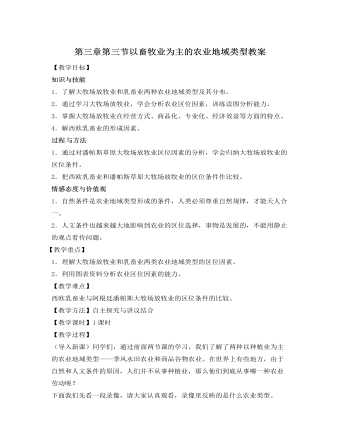
人教版新课标高中地理必修2第三章第三节以畜牧业为主的农业地域类型教案
知识与技能1.了解大牧场放牧业和乳畜业两种农业地域类型及其分布。2.通过学习大牧场放牧业,学会分析农业区位因素,训练读图分析能力。3.掌握大牧场放牧业在经营方式、商品化、专业化、经济效益等方面的特点。4.解西欧乳畜业的形成因素。过程 与方法1.通过对潘帕斯草原大牧场放牧业区位因素的分析,学会归纳大牧场放牧业的区位条件。2.把西欧乳畜业和潘帕斯草原大牧场放牧业的区位条件作比较。情感态度与价值观1.自然条件是农业地域类型形成的条件,人类必须尊重自然规律,才能天人合一。2.人文条件也越来越大地影响到农业的区位选择,事物是发展的,不能用静止的观点看待问题。【教学重点】1.理解大牧场放牧业和乳畜业两类农业地域类型的区位因素。2.利用图表资料分析农业区位因素的能力。
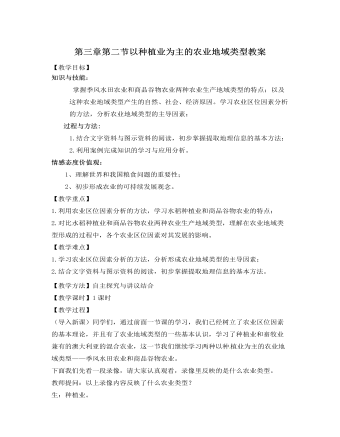
人教版新课标高中地理必修2第三章第二节以种植业为主的农业地域类型教案
【教学重点】1.利用农业区位因素分析的方法,学习水稻种植业和商品谷物农业的特点;2.对比水稻种植业和商品谷物农业两种农业生产地域类型,理解在农业地域类型形成的过程中,各个农业区位因素对其发展的影响。【教学难点】1.学习农业区位因素分析的方法,分析形成农业地域类型的主导因素;2.结合文字资料与图示资料的阅读,初步掌握提取地理信息的基本方法。【教学方法】自主探究与讲议结合【教学课时】1课时【教学过程】(导入新课)同学们,通过前面一节课的学习,我们已经树立了农业区位因素的基本理论,并且有了农业地域类型的一些基本认识,学习了种植业和畜牧业兼有的澳大利亚的混合农业,这一节我们继续学习两种以种 植业为主的农业地域类型——季风水田农业和商品谷物农业。
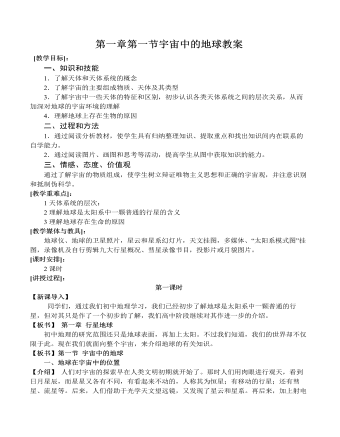
人教版高中地理必修1第一章第一节宇宙中的地球教案
【总结讲解】地球为生命物质的存在提供了三个最优越的条件,这也是其它行星不具备的条件——(1)日地距离适中(1.496亿km),使地表平均气温为15℃,有利于生命过程的发生和发展;地球上的温度,还有利于水的液态存在。适合生物呼吸的大气: (2) 地球的体积、质量适中,吸引大量气体聚集在地球周围,又经过漫长的演化,形成了以氮、氧为主的适合生物呼吸的大气。(3)海洋的形成: 由于地球内部放射性元素衰变致热和原始地球重力收缩及地球内部的物质运动等形成了原始大洋,地球最初的单细胞生命就出现在大洋中。(备注:此部分可以模拟演示或讲解地球存在生命的温度、大气、水等条件;假设地球温度过高或过低对地球生命的影响;引导学生分析地球大气、温度与地球水的关系)【板书】1、日地距离适中2、地球的体积、质量适中3、液态水的存在【启发提问】 宇宙中是否只有地球上存在有生命物质?